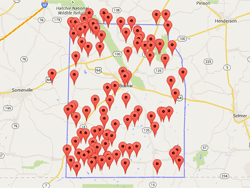Ramer cemetery has been added to the TNGenWeb Cemetery Database for Hardeman county. There are 472 known graves there.
The following four cemeteries in the Saulsbury area were recently added. These can be viewed at : http://usgwarchives.net/tn/hardeman/cemetery.html
- E.E. Low Cemetery
- T. Low Cemetery
- Elliotte Chapel (Af-Amer) Cemetery
- Guy (Af-Amer) Cemetery
A survey of the Saulsbury Cemetery was recently completed, just under 600 graves were documented. It can be viewed at http://usgwarchives.net/tn/hardeman/cemeterysz.html
There are at least twelve (12) African Americans buried in Polk Cemetery in Bolivar, Hardeman County, Tennessee.1 Various documentation contains the names of these individuals: three blacks have headstones; seven are mentioned in the Diary of John Houston Bills;2, 3 one is documented on March 2, 1902 in a Memphis, Tennessee Commercial Appeal newspaper article about Ezekiel Polk;4 and the twelfth is recorded in burial records of St. James Episcopal Church in Bolivar.5
* Three graves of African-Americans with headstones:
1. John McNeal, April 16, 1907, age 57;
2. Lila, wife of John, September 1909; [John and Lila had no children. Their estate was left to a niece, Lily Moore.]
3. In Memory of Rueben B., faithful servant [of John H. Bills] and honest man, 1846.
* Seven African-American burials mentioned in John H. Bills’ diary:2, 3
1. Charlotte, died July 28, 1853. “Thursday, July 28, 1853 … Our house servant, Charlotte, died this morning at 3 o’clock. She had been sick for 24 days of typhoid fever, during all of which time Dr. Neely attended her without affecting the slightest good in her case. We bury her in the family [Polk] Cemetery at 5 p.m.”
2. Victoria’s infant Emma, February 24, 1863 – Tuesday August 18, 1863. Victoria was a house servant who was a “general attendant.” It appears she attended Clara Bills (John H. Bills’ daughter). “Wednesday, September 18, 1861, Clara Bills & svt Victoria off for a visit to her friends at Huntsville.”
It appears Victoria was acquired by John H. Bills between 1845 and 1856. He referred to her several times in his diary. She “jumped the broom” with Willis, a servant of Dr. Wood, on Monday, December 29, 1862. She had an infant on February 24, 1863, who died on August 18, 1863. “Early this morning Victoria’s infant Emma died, disease convulsions from whooping cough … I bury Vic’s infant in the Polk Cemetery.”
3.- 7. Sam Bills, his wife Lucretia (Creasy), Creasy’s daughter Martha
Martha’s husband Willis, and Sam’s “only son.”
Sam Bills, circa 1797 – September 10, 1869. Sam was buried in Polk
Cemetery one day after his death (September 11) “beside his only son.”
John H. Bills had purchased Sam on February 19, 1839 from John Lea for $650.00. (John Lea was the person who sold The Pillars to John H. Bills. Hence Sam changed owners but stayed on the same plantation.) Sam was about 42 at the time. Sam held a special place with John H. Bills. Bills had Sam baptized “by sprinkling” on Saturday,
June 19, 1858. Bills’ diary contains no other mention of baptism of any other slaves.
Sam was a “good old servant” who had been with Bills “more than 30 years.” Bills wrote that Sam died of “old age – he was a faithful honest man, refused to leave me when free & was true to my interest during the War of the Rebellion – peace to his ashes.”
Lucretia (Creasy) Bills, wife of Sam, circa 1805 – December 24, 1870. John H. Bills purchased Creasy and her two children (Bob and Martha) on July 17, 1833 from Humphrey Keeble. Creasy was about 28, Bob was 2, and Martha was 2.
Creasy served as a milkmaid for Bills. She died just over one year after the death of her husband Sam. “Old Creasy who has been sick for 3 weeks expires at 9 ½ a.m.” Creasy was buried the next day at 2 p.m.
Martha Bills Mayhugh, daughter of Lucretia (Creasy), circa 1831 – September 17/18, 1870. Martha “jumped the broom” with Willis, another slave of John H. Bills. After Willis’ death, she married WilliamMayhugh on May 26, 1866.
On September 18, 1870, John H. Bills wrote, “Arrive at home at 5 ½ o’clock [a.m.] & find my ex servant Martha dead. She has been sick along time, leaves 7 or 8 helpless children.”6
Willis, husband of Martha, circa 1817 – September 16, 1862. John H. Bills purchased Willis on November 28, 1849 from Lucy Wynne. Willis was about 32 at the time. One day after his death, Willis was buried in Polk Cemetery.
Sam’s only son – name and dates unknown; died before his father, who died on September 10, 1869.
* Jim, slave of Ezekiel Polk, circa 1776 – between 1860 and 1870.4
According to a Commercial Appeal newspaper article about Ezekiel Polk dated March 2, 1902, “… In 1849 Edwin Polk gave the land for Polk Cemetery in southwest Bolivar, ‘to be forever a family burying ground.’ To this place Ezekiel Polk’s remains were removed in the early 50s, and a second monument erected. Close by was put to rest ‘Uncle Jim,’ his faithful servant, who followed his master’s fortunes from Pennsylvania to Middle Tennessee; thence to West Tennessee. A daughter of this same Uncle Jim is at present living in the Polk place in her ninety-sixth year.” [Some of the dates in this article are not accurate. According to John H. Bills’ diary:
Thursday, November 20, 1845 – A fine day. We spend it removing the remains of our friends to the Polk Cemetery. We succeed in removing all the tombstones & the bones of Colonel Ezekiel Polk ….
It also appears that Ezekiel Polk brought Jim to Tennessee from North Carolina, not Pennsylvania.] Note: After Ezekiel Polk’s death, Jim became a slave of Ezekiel’s son Edwin Polk, and, after Edwin’s death in 1854, was inherited by Edwin’s wife, Octavia Jones Polk.
The daughter of Jim, who was referenced in the Commercial Appeal article, appears to have been a freedwoman named Lively Polk.
* Rena, slave of Major [E. P.] McNeal, died March 6, 1865.5
St. James Episcopal Church documented the funeral of: “… Rena an old servant of Maj. McNeal’s at Polk Cemetery – services at the grave.”
It is reasonable to assume there are other African Americans buried in Polk Cemetery. The above twelve slaves/freedpersons are ones about whom we have documentation.
SOURCES:
1 Polk Cemetery is located on S. Union Street in Bolivar, Hardeman County, Tennessee. Some of Hardeman County’s most prominent citizens are buried there, including Colonel Ezekiel Polk, grandfather of President James K. Polk.
The twelve African Americans mentioned above are buried in the Southwest corner lot.
2 John Houston Bills Papers, Series 2, Diary, 1843-1871. Southern Historical Collection, University of North Carolina at Chapel Hill, Microfilm Accession Number J8.
3 “Diary of John Houston Bills,” Bills Family Papers, 1826-1877. Manuscript Unit, Tennessee State Library & Archives, Nashville, Microfilm Accession Number 123, 1972. (This diary is an extracted, typed transcription by Virginia M. Bowman, third great granddaughter of John Houston Bills. It contains some errors.)
4 “Ezekiel Polk, His Life and Character,” Commercial Appeal, Memphis, Tennessee, March 2, 1902.
5 “Funerals,” Church Records. St. James Episcopal Church, 223 Lafayette Street, Bolivar, Hardeman County, Tennessee, page 171.
6 Names of nine children of Martha Bills Mayhugh are noted in Plantations of John H. Bills, his Slaves and Their Descendants, 1820 – 1920, by Katie Brown Bennett. A copy of this book is available in the Hardeman County Regional Library, Bolivar.
COMPILED AND SUBMITTED BY: Katie Brown Bennett




